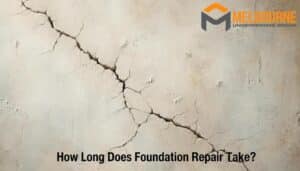
Yes, building a strong basement foundation is crucial. It ensures the structural integrity of the entire building, preventing issues like subsidence and cracks.
Additionally, a robust foundation incorporating the best basement construction methods in Australia helps isolate the basement against moisture and external weather conditions.
In this blog, we’ll discuss more about the importance of a basement foundation and the risks of having a weak foundation.
Why Is the Basement Foundation Critical for Structural Integrity?
The basement foundation is critical for structural integrity because it distributes the weight of the building evenly, preventing collapse or uneven settling. This foundation plays a pivotal role in maintaining the stability of a structure, especially when considering different types of house footings.
The following are some key reasons to consider:
- Weight distribution: A strong foundation evenly distributes the building’s weight, preventing excessive stress on any particular area.
- Soil stability: Foundations are designed to provide stability, even in diverse soil conditions, which might otherwise lead to shifting or sinking.
- Environmental resistance: Foundations protect against environmental challenges like moisture, temperature fluctuations, and natural disasters.
- Structure longevity: A well-built foundation ensures the longevity of the building, reducing the need for costly repairs due to foundational issues.
- Upper structure support: It provides a level base for the construction of walls and floors, ensuring the overall structural integrity of the building.
What Are the Risks of Having a Weak Basement Foundation?
The following are the main risks of having a weak basement foundation:
Structural Instability
A weak basement foundation can lead to structural instability. This instability can manifest as cracks in walls, uneven floors, and even the collapse of building parts. It compromises the building’s ability to withstand external forces, such as earthquakes or heavy winds, especially in constructions lacking robust support like screw piling and bored concrete piers.

Water Damage and Mould Growth
Without a strong foundation, basements are more susceptible to water seepage. This can result in chronic dampness, leading to the growth of mould and mildew. Such conditions damage the property and pose serious health risks to occupants, including respiratory problems and allergic reactions.
Decreased Property Value
A weak foundation significantly reduces a property’s value. Potential buyers are often deterred by the high costs and effort required for repairs. Furthermore, the visible signs of foundation problems, such as cracks and water damage, can make the property less appealing, impacting its marketability and resale value.
Does Soil Type Affect Basement Foundation Stability?
Yes, soil type greatly affects basement foundation stability. Different soil types have varying abilities to bear weight and respond differently to moisture content, affecting foundation integrity.
For instance, clay soils can expand and shrink dramatically with moisture changes, leading to foundation movement.
Do House Footings Affect Basement Stability?
Yes, house footings significantly affect basement stability. They are designed to distribute the weight of the house evenly, preventing uneven settling that can lead to structural issues. Properly constructed footings ensure a stable basement foundation while minimising the risk of other foundational problems.






